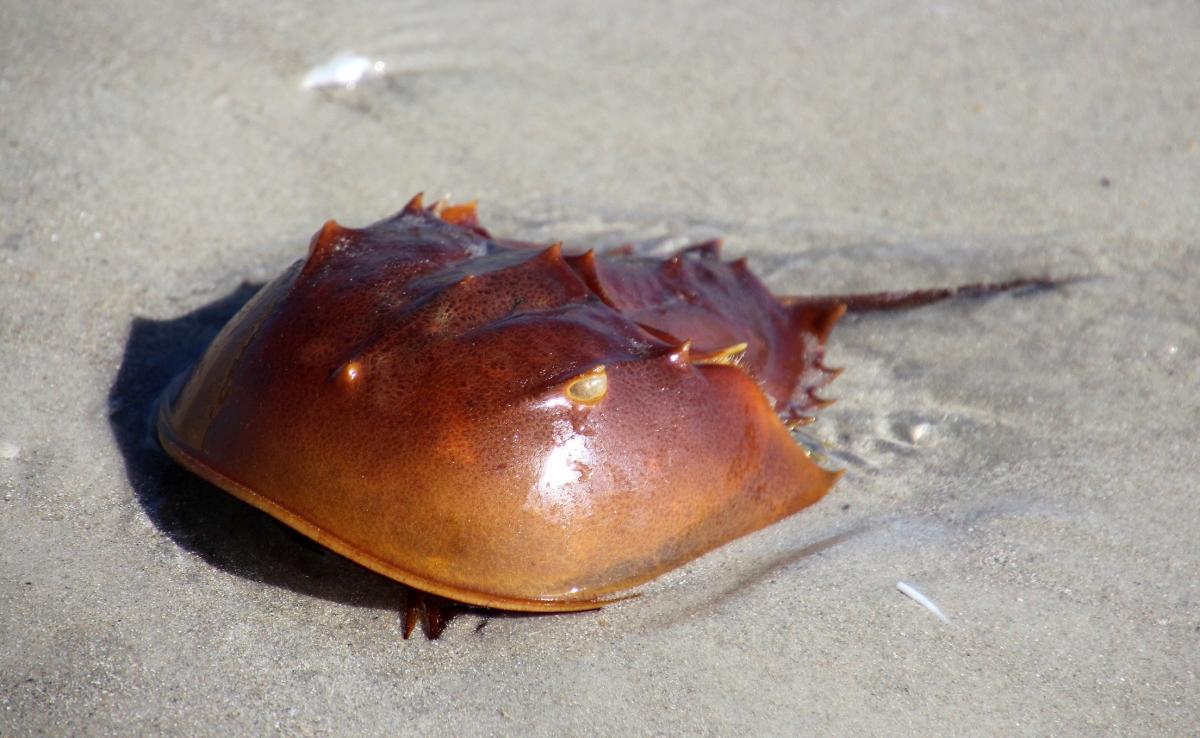Author’s Note: “New to Delaware, I took my 18-month-old on day trips to the sleepy beaches along Delaware Bay, where we first encountered horseshoe crabs. My life then was dominated by firsts: first steps, first words, etc. In contrast, the fishermen, bay, and crabs had collectively enjoyed a long existence and connection to each other. Watching her interact with the crabs, I felt that she—just barely of this world—and I—witness of her becoming—were just as tied to a mythology and mysterious life force as these ancient creatures.”
Warrior’s Helmet Crab
Part I
THE BEACH IS EMPTY OF HUMANS, save Penny and me and the fisherman who walks the bay tossing crabs into the boat he tugs. On land they overlap, an overturned jar of gray tortoiseshell buttons, here to salute the high-tide full moon with a good spawn.
We hug the detritus-drenched shoreline of Bowers Beach as it stirs from hibernation, a town sleepy even in summer—no funnel cake, soft ice cream, arcade. It’s Penny’s first beach since learning to walk and the crabs’ mecca for millennia. Today they’ve arrived from sun glitter grown brighter untouched by man’s leisure for months.
The fisherman greets us, shares his family business: the shore he’s walked since fourteen, harvesting males for blood.
They even use it for cancer, he says. It cured my dad, fellow blue-blood tradesman.
Shakespearean clown, his Delmarvese speaks of brackish waters, calm and flat as the Great Plains, as he slogs through crabs dense as settlers thronging for limited land.
Penny’s newborn-blue-turned-sea-green eyes watch warily the crabs bobbing in water, appendages doubly animated by surf. The fisherman turns one over to expose the hook that divides sexes, that grasps the female’s shell to hitch a ride to shore where she will lay eggs and he his seed—fierce appendage for such a slow act. The fisherman could do this blind: feel for their “boxing gloves” underwater.
Part II
In the factory, white jackets, donned gloves and masks saunter by crabs propped up like puppets, affixed to lab benches in neat rows, shells reflecting fluorescence barring barnacles’ rough blooms.
Each crab bent at hinge, blue blood drips from needle to bottle, a blue that traps toxins in inescapable clots, an antifreeze- mixed-with-milk that tests tools, injections—anything that penetrates human skin—for purity.
Returned to Delaware Bay a day later, the crabs are weak but not bloodless.
Part III
Penny toddles along the sand, a gift for uncalloused soles. So focused on the world inside each grain, she doesn’t see the horseshoe until we’re on him. Still clumsy with her own limbs, she watches me turn him over, flipped on his back by a wave.
Spitting images of fossil kin who swam and spawned when water covered all, their peaked shells tell of Mt. Everest and seafloors that spread to bare the ocean’s bloody heart. They’ve seen five ice ages, Pangaea form and pull apart, the asteroid, a time before bloodletting.
Little need for evolution when you’re so good at surviving.
Penny’s tiny fingers read the barnacles, skim the sand- polished curves, ridges shiny as obsidian in midday sun.
It feels like yesterday when her life was folded into mine, punctuated only by waves, tides, and moons.
*The Japanese call horseshoe crabs “warrior’s helmet crab” from an ancient tale of courageous samurais, who sacrificed their lives in battle and were reborn fully armored crabs to protect the waters surrounding their homeland.
♦
Caroline N. Simpson is a poet, essayist, and playwright and has thrice been nominated for a Pushcart Prize in poetry and nonfiction. She was awarded the 2020 Established Artist Fellowship in Poetry by the Delaware Division of Arts. Her chapbook, Choose Your Own Adventures and Other Poems, was published by Finishing Line Press (2018). She teaches high school English at The Tatnall School, in Wilmington. Website: carolinensimpson.com.
Delmarva Review publishes the best of new prose and poetry selected from thousands of submissions annually. As a 501(c)(3) nonprofit, it receives partial financial support from individual contributions and a grant from the Talbot County Arts Council with funds from the Maryland State Arts Council. The review is available worldwide in paperback and electronic editions from Amazon.com and other major online booksellers and specialty regional bookstores. Website: DelmarvaReview.org.
# # #



Reed Fawell says
Wonderfully written, and expressed. Thanks.